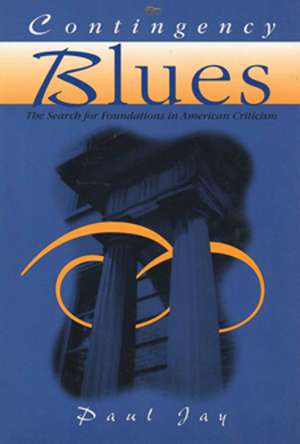Contingency Blues: The Search For Foundations In American Criticism: Wisconsin Project on American Writers
Autor Paul Jayen Limba Engleză Paperback – 14 mar 1997
From Emerson to Rorty, American criticism has grappled in one way or another with the problem of modernity—specifically, how to determine critical and cultural standards in a world where every position seems the product of an interpretation. Part intellectual history, part cultural critique, this provocative book is an effort to shake American thought out of the grip of the nineteenth century—and out of its contingency blues.
Paul Jay focuses his analysis on two strands of American criticism. The first, which includes Richard Poirier and Giles Gunn, has attempted to revive what Jay insists is an anachronistic pragmatism derived from Emerson, James, and Dewey. The second, represented most forcefully by Richard Rorty, tends to reduce American criticism to a metadiscourse about the contingent grounds of knowledge. In chapters on Emerson, Whitman, Santayana, Van Wyck Brooks, Dewey, and Kenneth Burke, Jay examines the historical roots of these two positions, which he argues are marked by recurrent attempts to reconcile transcendentalism and pragmatism. A forceful rejection of both kinds of revisionism, Contingency Blues locates an alternative in the work of the “border studies” critics, those who give our interest in contingency a new, more concrete form by taking a more historical, cultural, and anthropological approach to the invention of literature, subjectivity, community, and culture in a pan-American context.
Paul Jay focuses his analysis on two strands of American criticism. The first, which includes Richard Poirier and Giles Gunn, has attempted to revive what Jay insists is an anachronistic pragmatism derived from Emerson, James, and Dewey. The second, represented most forcefully by Richard Rorty, tends to reduce American criticism to a metadiscourse about the contingent grounds of knowledge. In chapters on Emerson, Whitman, Santayana, Van Wyck Brooks, Dewey, and Kenneth Burke, Jay examines the historical roots of these two positions, which he argues are marked by recurrent attempts to reconcile transcendentalism and pragmatism. A forceful rejection of both kinds of revisionism, Contingency Blues locates an alternative in the work of the “border studies” critics, those who give our interest in contingency a new, more concrete form by taking a more historical, cultural, and anthropological approach to the invention of literature, subjectivity, community, and culture in a pan-American context.
Preț: 105.45 lei
Nou
Puncte Express: 158
Preț estimativ în valută:
20.18€ • 20.85$ • 16.80£
20.18€ • 20.85$ • 16.80£
Carte disponibilă
Livrare economică 05-19 martie
Preluare comenzi: 021 569.72.76
Specificații
ISBN-13: 9780299154141
ISBN-10: 0299154149
Pagini: 234
Dimensiuni: 152 x 229 x 13 mm
Greutate: 0.32 kg
Ediția:New.
Editura: University of Wisconsin Press
Colecția University of Wisconsin Press
Seria Wisconsin Project on American Writers
ISBN-10: 0299154149
Pagini: 234
Dimensiuni: 152 x 229 x 13 mm
Greutate: 0.32 kg
Ediția:New.
Editura: University of Wisconsin Press
Colecția University of Wisconsin Press
Seria Wisconsin Project on American Writers
Recenzii
“An excellent book, it sharply and helpfully mediates the recent debates sparked by pragmatist attacks on foundationalism over the ‘legitimation crisis’ of modernity, and it shows, as no book has yet done, the specific relevance of these debates to American cultural criticism since Emerson.”—Gerald Graff, University of Chicago
“Jay makes a major contribution to theoretical debates about poststructuralism and disciplinary controversies involving cultural analyses and ethnic studies. Contingency Blues will be of interest to a wide range of scholars and theorists, including those in cultural studies, philosophy, history of rhetoric, critical theory, speech communications, American studies, and rhetorical studies generally.”—Steven Mailloux, University of California–Irvine
Notă biografică
Paul Jay is associate professor of English at Loyola University of Chicago. He is the author of The Selected Correspondence of Kenneth Burke and Malcolm Cowley, 1915–1981, and Being in the Text: Self–Representation from Wordsworth to Roland Barthes.
Descriere
From Emerson to Rorty, American criticism has grappled in one way or another with the problem of modernity—specifically, how to determine critical and cultural standards in a world where every position seems the product of an interpretation. Part intellectual history, part cultural critique, this provocative book is an effort to shake American thought out of the grip of the nineteenth century—and out of its contingency blues.
Paul Jay focuses his analysis on two strands of American criticism. The first, which includes Richard Poirier and Giles Gunn, has attempted to revive what Jay insists is an anachronistic pragmatism derived from Emerson, James, and Dewey. The second, represented most forcefully by Richard Rorty, tends to reduce American criticism to a metadiscourse about the contingent grounds of knowledge. In chapters on Emerson, Whitman, Santayana, Van Wyck Brooks, Dewey, and Kenneth Burke, Jay examines the historical roots of these two positions, which he argues are marked by recurrent attempts to reconcile transcendentalism and pragmatism. A forceful rejection of both kinds of revisionism, Contingency Blues locates an alternative in the work of the “border studies” critics, those who give our interest in contingency a new, more concrete form by taking a more historical, cultural, and anthropological approach to the invention of literature, subjectivity, community, and culture in a pan-American context.
Paul Jay focuses his analysis on two strands of American criticism. The first, which includes Richard Poirier and Giles Gunn, has attempted to revive what Jay insists is an anachronistic pragmatism derived from Emerson, James, and Dewey. The second, represented most forcefully by Richard Rorty, tends to reduce American criticism to a metadiscourse about the contingent grounds of knowledge. In chapters on Emerson, Whitman, Santayana, Van Wyck Brooks, Dewey, and Kenneth Burke, Jay examines the historical roots of these two positions, which he argues are marked by recurrent attempts to reconcile transcendentalism and pragmatism. A forceful rejection of both kinds of revisionism, Contingency Blues locates an alternative in the work of the “border studies” critics, those who give our interest in contingency a new, more concrete form by taking a more historical, cultural, and anthropological approach to the invention of literature, subjectivity, community, and culture in a pan-American context.










